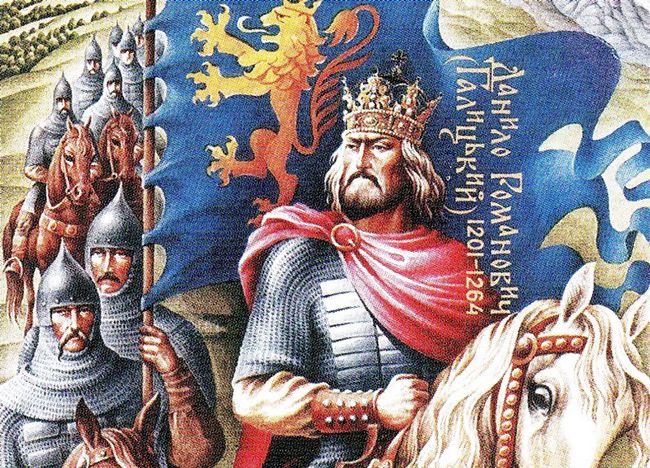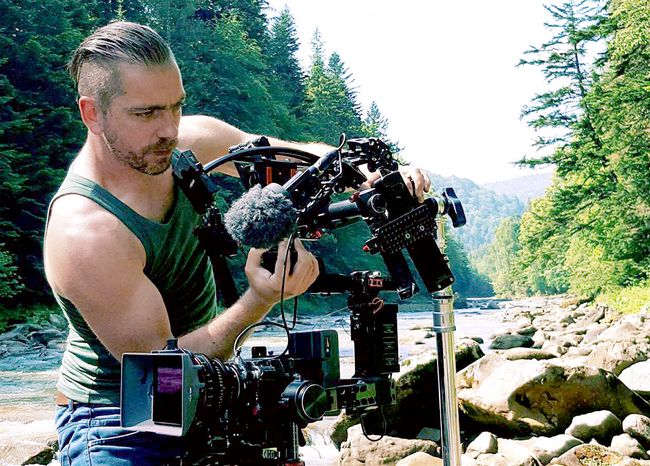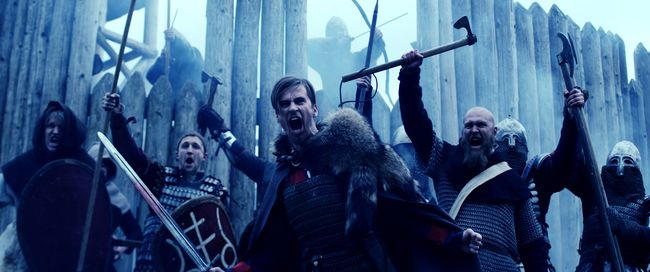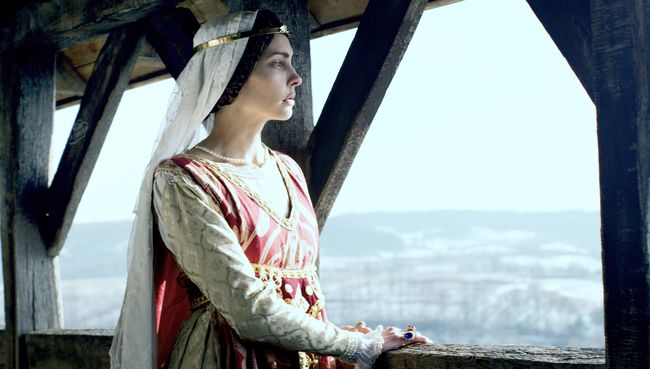King Danylo – further proof that Ukraine is part of Europe
Film director Taras Khymych knows how to get modern audiences interested in early history
Taras Khymych’s feature film Zhyva (Alive), based on a true story about Anna Popovych, messenger of the Ukrainian Insurgent Army (UPA), has had a good press in Ukraine. Meanwhile, his team has started working on another project, on a larger scale, dedicated to Daniel of Galicia [also known as King/Grand Prince Danylo of Volyn and Halych in Ukrainian historiography]. A teaser trailer was released several days ago and the production is expected to premiere in the spring of 2018. More on this, on how to keep a balance between historical facts and fiction, how to make money making a movie in the following interview with film director Taras KHYMYCH.
MANY WANTED TO LIVE IN KING DANYLO’S RUS’
Mr. Khymych, this is your second project dedicated to a historical issue. Do you think that such productions are in demand these days?

“King Danylo will be a movie dealing with the contemporary environment rather than history. My first movie Zhyva is also a life story rather than an episode in Ukrainian history. It’s a story about an individual struggling to survive. Whereas the first one would be interesting for a female audience, the second one is a historical action movie that, hopefully, will be interesting for both the female and male audiences. I’m fond of working on costume dramas that take me back hundreds of years. The environment helps me better understand the heroes. In fact, my documentaries are also along the historical lines, the First and Second World War.
“King Danylo interests me as a military leader. He wasn’t like others who focused on court life. He was a warrior and statesman. His brother Vasylko Romanovych was also a warrior. I could concentrate on their relationships that proved hostile at times, but I was interested in his kingdom, Rus’, at the time. I wanted to correct the stereotype of Kyivan Rus’ created by the old Soviet films. Along with the Ruthenians, there were Chinese, Moors, and Arabs. The Silk Road created a multicultural environment. It was a full-fledged European country where many would want to live. We don’t mean this production to be historically accurate, although the plot relies on certain historical facts. This is a movie, so there is room for fiction. There is no law banning this, is there?”
There is scarce verified historical data relating to King Danylo and what data is available, concerning the territory of his domain, remains subject to debate. What data did you use?
“We used Lviv historian Leontii Voitovych’s findings. Interestingly, he refers to Daniel of Galicia as Danylo Romanovych and offers his own view on the epoch. Long before starting on this project, I read Den’s features on the subject.
“We relied on historical findings and tried to create an image that would be close to the modern audience. We have certain ideas concerning the costumes, involving elements of Byzantine or Western European uniforms. After launching the teaser trailer, we found ourselves under attack from some historians who said our characters’ hairstyles were too modern. Others said our nomads looked too exotic, like computer game images. Personally, I regard this as standard filmmaking practice. I’m convinced that various creative approaches can be accepted.”
FILMMAKING SPELLS DEBATE
Why do you think it’s important to have a Ukrainian production about a king and his kingdom today?
“Being a king is one of the European values. King Danylo was further proof that Ukraine was part of Europe, that it had long kept democratic traditions; that Ukraine had been keeping pace with Europe, except for a period when it lagged behind, for certain historical reasons. King Danylo ruled in the 13th century, and his reign is proof that Ukraine is not a ‘25-year-old state’ – as some are trying to prove.

SCENE FROM KING DANYLO WITH YURII VYKHOVANETS AS THE KING’S BROTHER VASYLKO
“I believe that my new production will encourage the audiences to take an interest in our early history. Our teaser trailer caused debate ranging from praising to tomato-throwing commentaries. Some of them came as a total surprise, but filmmaking spells debate.
“Unlike recent events, old history isn’t a potential cause for conflict or inner rift. It encourages interest that can serve to unite and integrate. Let me remind you that Kyiv was part of the Halych and Volyn Principality [a.k.a. Galicia-Volhynia]. It is popularly associated with Western Ukraine, namely Halychyna, but the fact remains that King Danylo had everything to do with Volyn and fought Halych. There is distorted data relating to that epoch and we want our production to rectify it. I’m amazed that no such movies have been made to date. I conceived the idea a long time ago. Now that our first movie is being screened, that we’ve accumulated some experience, I believe that the next one will prove a success.”
Does the plot embrace King Danylo’s life story or some episodes from it?
“It reflects what we believe are the most notable episodes, stretching over some 30 years. His youth will be hinted at, in a flashback mode. This isn’t a life-story movie. He had many enemies and we’ll focus on just one. We’re still working on the script and casting. We want this production to be dynamic and gripping. Our first movie, Zhyva, is emotion-packed. The second one will be more on the action side. There were many sad, dramatic, and treacherous events in King Danylo’s life, but we’ll focus on the positive, winning ones.

SCENE FROM KING DANYLO WITH MYROSLAVA RACHYNSKA AS DANYLO’S MOTHER
“The man borrowed lots of concepts from Eastern Europe. He encouraged innovative initiative, including military reform and various advanced technologies. In fact, he looked more like a European leader in vogue at the time. And this considering that his troops looked far less attractive, each man wearing what he thought was most comfortable. He was the first to introduce insignia, lest his troops fall under friendly fire. This reminds me of our military wearing special armbands in 2014.”
TECHNOLOGICAL REVOLUTION
Some historians believe that Danylo’s mother Anna was the daughter of Byzantine Emperor Isaac II. Will this assumption be reflected in the plot?
“Absolutely. You can see her in the teaser trailer. She gave birth to Danylo at an early age. There will certainly be a Byzantine chapter of the script. Among other things, it appears very attractive visually. Here is room for creative maneuver. Western filmmaking experience shows that such aspects should never be missed. Another important theme is Danylo’s coronation. Here we’re working hand in glove with historians. The Teutonic knights who brought the crown, the undecorated church dating back to the 12th-13th cc. – all this will be in the plot.”
King Danylo had three capital cities: Volodymyr, Halych, and Kholm. Are there any architectural sites dating back to that period that could be used as settings?
“Regrettably, only fortresses dating back to the 14th-15th cc., and very few sites dating back to the period. I think we’ll have to generate some sites, using 3D graphics. There were a number of wood structures at the time and we’ve started building some to make a contemporary town setting. We’re using European standards as there are some such structures in Romania and Germany. This setting will surely have nothing to do with the Muscovite izba [traditional Russian log house] that often figures in the [old Soviet and modern Russian] films about that period.”
A historical action movie must have special effects, broad scale battle scenes. Do you have the means and capacities in Ukraine?
“We don’t expect any problems there. We’ve been in touch with some stunt companies that have taken part in Western productions. We have everything we need in Ukraine, so long as we can afford it. A broad scale technological revolution has taken place in the Ukrainian filmmaking industry. There are a number of innovative techniques that make the process less expensive. This is very important for our team. Five or six years back, we’d have had to cope with considerably heavier expenses.
“The screening of our first movie, Zhyva, shows that films can be made and can pay back in Ukraine. It was screened at 21 out of 150 movie theaters. Not many, but not surprising, considering that there is little confidence placed in a premiere [without a heavily funded promotion campaign]. Yet even this helped us collect over a million hryvnias over two weekends. Also, this movie will be screened in Cape Town, starting April 7, and there are talks underway with German and Austrian distributors. This production cost us 2.5 million hryvnias.”
Newspaper output №:
№21, (2017)Section
Culture





